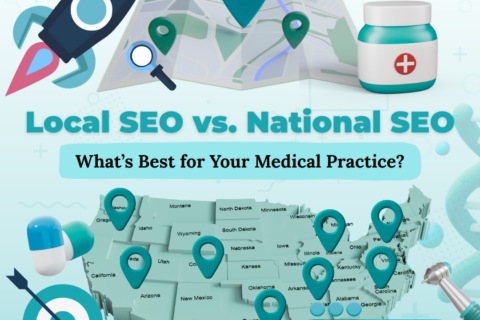Competing With Hospitals Successfully
Introduction
For decades, private practice has served as the bedrock of personalized healthcare, offering patients a close, one-on-one relationship with their physicians. However, with the rise of hospital conglomerates, corporate-owned clinics, and healthcare systems, the landscape has shifted dramatically. Today, physicians operating private practices face immense challenges in competing with larger healthcare providers. While hospitals offer scale, convenience, and a vast array of services under one roof, independent practices remain vital to providing personalized, patient-focused care.
In this case study, we’ll explore the various obstacles private practices face when competing with hospitals and offer comprehensive strategies to ensure that independent practices not only survive but thrive. We’ll explore how patient retention, digital presence, and community engagement can transform a private practice into a formidable competitor in an ever-evolving healthcare industry.

Challenges Facing Private Practices
The healthcare industry is becoming increasingly dominated by large hospital systems and corporate-owned entities. According to the American Medical Association (AMA), only 49.1% of physicians in the U.S. are currently practicing in an independent setting—a significant decline from the 60.1% reported in 2012. Financial strain, coupled with the impact of the COVID-19 pandemic, has accelerated this decline, as many private practices struggled to remain financially viable.
Despite these challenges, many physicians still prefer private practice due to the autonomy it offers. However, to remain competitive in a healthcare landscape where patients are more likely to choose a hospital over an independent practitioner, private practices must adapt by implementing strategic, patient-centered solutions.
The Impact of Competition in Healthcare
Competition exists in all industries, and healthcare is no exception. In the healthcare sector, competition is generally viewed as a good thing for patients, as it pushes providers to continuously improve the quality and affordability of care. However, private practices face unique challenges when competing against large hospitals that have more resources, larger teams, and greater marketing power.
This competition is not just about gaining more patients but also about acquiring and retaining qualified staff. Larger hospitals are more likely to offer higher salaries, better benefits, and more stable employment compared to smaller, independent practices. As a result, private practices often struggle to attract top talent and retain their existing staff members.
The challenges are significant, but they are not insurmountable. With the right strategies in place, private practices can successfully compete with hospitals and other larger healthcare providers. The key lies in leveraging their unique strengths—such as personalized patient care—and integrating modern business practices to ensure long-term success.
Strategies for Private Practice Success
1. Patient Retention and Loyalty
The backbone of any successful private practice lies in its ability to retain patients. While hospitals often lure patients with convenience and a wide range of services, private practices can offer something hospitals often struggle with: personalized, patient-focused care.
To build patient loyalty, private practices must go above and beyond in their service delivery. Patients want to feel valued and cared for—not like just another number on a hospital’s waiting list. Independent practitioners have a unique opportunity to cultivate meaningful relationships with their patients, offering tailored care that meets the specific needs of each individual.
Building Loyalty Through Personalized Care
One way to ensure patient retention is to emphasize personalized care at every stage of the patient journey. This means offering services that cater to the unique needs of each patient, ensuring that they receive individual attention and care from the moment they walk into the clinic until they leave.
Training staff members to engage with patients meaningfully is essential. Whether it’s the receptionist greeting patients with warmth or the nursing staff showing empathy and patience during visits, every touchpoint should reflect the core value of patient-centric care.
Creating Loyalty Programs
Consider implementing a patient loyalty program. While this may sound unconventional for a healthcare practice, it could involve providing discounts on services for repeat patients, offering exclusive early access to new services, or even giving long-term patients personalized wellness plans. These small incentives show appreciation for loyal patients, making them more likely to return and refer your practice to others.
2. Digital Presence and Online Reputation
In today’s tech-driven world, a strong digital presence is no longer optional; it’s critical. A survey by Google revealed that 77% of patients use online searches before booking an appointment. If your private practice isn’t visible online or lacks a positive reputation, it will be much harder to attract new patients, especially those who are younger and more tech-savvy.
The Importance of SEO
Search engine optimization (SEO) is one of the most effective ways to ensure that your practice shows up when potential patients search for healthcare providers in your area. For instance, if someone searches “best ENT doctor in Jacksonville,” you want your practice to appear among the top search results. The higher your practice ranks, the more likely it is that patients will choose you over a competitor.
To achieve this, optimize your website with relevant keywords, update your blog regularly with useful healthcare information, and ensure that your website is mobile-friendly. Most people today access information on their phones, so a mobile-optimized site is crucial.
Online Reviews and Social Proof
Building trust with potential patients involves curating positive online reviews. Encourage satisfied patients to leave reviews on Google, Yelp, and other healthcare-specific platforms like Healthgrades.
Equally important is how you manage negative reviews. Responding promptly and professionally to a negative review demonstrates that you care about patient feedback and are committed to improving the patient experience. This approach can go a long way in turning a negative situation into a positive one.
Social Media Engagement
Use social media platforms to interact with your patients and community. Platforms like Facebook, Instagram, and LinkedIn offer opportunities to share health tips, provide updates about your practice, and even showcase patient testimonials. Social media helps humanize your practice, making it more relatable and approachable.
3. Emphasizing Personalized Patient Care
One of the key advantages private practices have over large hospital systems is the ability to offer more personalized care. Larger systems often treat patients as one of many, whereas independent practices can focus on developing strong, individualized relationships.
This is particularly important when competing with hospitals, as patients are increasingly looking for healthcare providers who offer a more personal touch.
Implementing Personalized Treatment Plans
For instance, if you are an ENT specialist, your practice could offer custom treatment plans that take into consideration each patient’s unique medical history, lifestyle, and preferences. These individualized treatment plans can help build trust and make patients feel more involved in their care decisions.
Building Relationships at Every Touchpoint
From the moment a patient books an appointment to the follow-up after their visit, each interaction offers an opportunity to reinforce your practice’s commitment to personalized care. Train your staff to communicate effectively, show empathy, and be responsive to patient needs. Consider implementing follow-up calls or surveys to gauge patient satisfaction and ensure continuous improvement in the care you provide.
4. Community Engagement and Building Relationships
Private practices can set themselves apart by forging strong connections with their local communities. While hospitals may have more resources, they often lack the personal touch that small, community-based practices can offer.
Building strong community relationships helps ensure that your practice remains top of mind for patients, even when they aren’t actively seeking medical care.
Hosting Community Events and Outreach Programs
Community engagement could involve hosting health fairs, offering free seminars on health topics, or participating in local events. By positioning yourself as a trusted resource within the community, patients will view your practice as an integral part of their lives.
Collaborating with Other Local Healthcare Providers
Building professional relationships with other local healthcare providers is another powerful strategy. Forming a referral network allows you to offer your patients more comprehensive care and enables other healthcare providers to refer patients to your practice.
5. Staff Development and Retention
Your staff is one of your practice’s most valuable assets. It is essential to invest in their development to ensure they have the latest knowledge, skills, and tools to provide top-tier care.
Ongoing Training and Professional Development
Provide your staff with regular training opportunities, whether through workshops, seminars, or online courses. When your staff feels empowered and up-to-date with the latest medical advancements, their confidence in providing excellent care grows, which directly impacts patient satisfaction.
Fostering a Positive Work Environment
In addition to professional development, focus on creating a supportive and positive work environment. Staff who feel valued and supported are more likely to remain with your practice, reducing turnover and ensuring that patients receive consistent, high-quality care.
6. Expanding Services to Meet Community Needs
To compete effectively with hospitals, consider expanding the services your practice offers. Adding new services can not only help attract new patients but also provide your existing patients with more comprehensive care options.
Identifying Service Gaps
Conduct surveys, interviews, and focus groups to identify what services your patients need but aren’t currently receiving. For example, if you’re an ENT practice, you might add allergy testing, hearing aid services, or pediatric ENT care.
Specialized Services for Niche Markets
Offering specialized services for niche markets can help differentiate your practice. For instance, you might offer specialized care for seniors or children, or even a concierge medicine model where patients pay a subscription for more personalized, on-demand care.
7. The Power of Social Proof and Online Reviews
Patients trust recommendations from other patients. Social proof, particularly through online reviews and testimonials, is one of the most powerful marketing tools for a healthcare practice. Potential patients are far more likely to choose a practice that has numerous positive reviews and testimonials over one with little or negative feedback.
Encouraging Reviews and Managing Feedback
Make it easy for your satisfied patients to leave reviews. You can send follow-up emails or texts with a direct link to your review page. Be sure to thank patients for their reviews, whether positive or negative, and address any concerns raised in a negative review professionally and promptly.
Check out our downloadable PDF HERE!
Conclusion: Competing Successfully Against Hospitals
The landscape of healthcare is undoubtedly shifting, but private practices still have a unique and important role to play. By focusing on patient retention, enhancing digital presence, offering personalized care, engaging with the community, investing in staff development, and expanding services, independent practitioners can effectively compete with larger hospital systems.
While the challenges are significant, private practices have unique strengths that allow them to provide exceptional care and build lasting patient relationships. By adopting modern strategies and remaining adaptable to the changing healthcare environment, private practices can not only survive but thrive in the face of competition.
The key is to recognize the strengths of your practice and use them to your advantage. Private practices may never be able to compete with hospitals on size or scale, but they can certainly compete—and win—when it comes to providing high-quality, personalized care that meets the needs of their patients and community.


